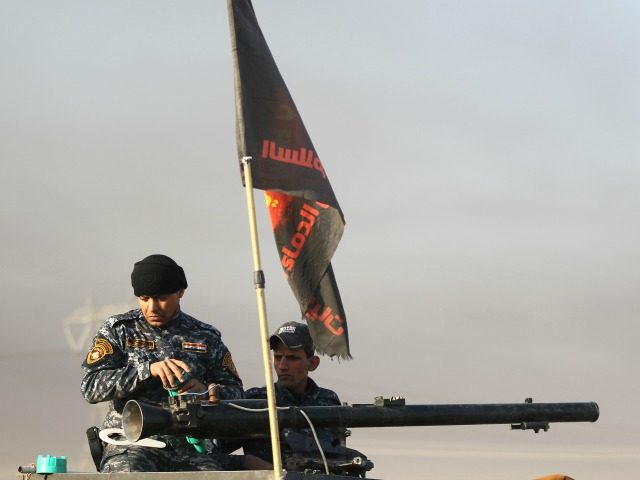(AFP) – Secretary of Defense Ash Carter said Sunday that operations to retake the Iraqi city of Mosul from the Islamic State group were key to defeating the jihadist group.
“This is a decisive moment in the campaign to deliver ISIL a lasting defeat,” Carter said in a statement.
“We are confident our Iraqi partners will prevail against our common enemy and free Mosul and the rest of Iraq from ISIL’s hatred and brutality.”
Iraqi forces launched operations to retake Mosul, a city whose capture by the Islamic State group two years ago left the country on the brink of collapse, the prime minister said Monday.
The northern city was where IS supremo Abu Bakr al-Baghdadi publicly proclaimed a “caliphate” straddling Iraq and Syria in June 2014.
With the support of Iran and a US-led coalition, Iraqi forces have since regained much of the ground lost to IS and Mosul is the extremist group’s last major stronghold in Iraq.
“Today I declare the start of these victorious operations to free you from the violence and terrorism of Daesh (IS),” Prime Minister Haider al-Abadi said in a televised address.
The commander-in-chief of Iraq’s armed forces did not divulge details of the latest movements on the ground but forces have recently been tightening the noose around Mosul.
A coalition of myriad and sometimes rival Iraqi forces — including the US-led coalition, Kurdish peshmerga and Iraqi government forces — will have to fight their way through IS defenses to reach the city, in some cases over distances of dozens of kilometers.
Then they will likely seek to surround the city before launching an assault, marking the start of deadly street fighting with die-hard jihadists.
Iraq’s special forces said the peshmerga were leading the first push on Mosul’s eastern front. Lt. Col. Ali Hussein said his men were also anxious to move out to the front line as soon as possible, but expected they would wait near the town of Khazer for another day or two. He spoke just hours after the long-awaited battle began Monday morning.
According to Hussein, an earlier political deal between the country’s Kurdish region and the central government in Baghdad has agreed that Kurdish forces would advance first and bring a cluster of villages — the home of Christian, Shabak and other minority groups — under their regional control.
Saud Masoud, also with the special forces, said that after the Kurdish troops “take the area that they want,” the special forces would then move to the new front and continue the push into Mosul.
Abadi vowed that only government forces would enter Mosul, a Sunni-majority city that IS seized with relative ease partly because of local resentment towards the Shiite-dominated security forces.
Shiite militia groups have been accused of serious abuses against Sunni civilians in the course of operations to reconquer territory from IS.
“The force leading liberation operations is the brave Iraqi army with the national police and they are the ones that will enter Mosul, not others,” Abadi said.
Baghdad is also keen to check the influence of the autonomous Kurdish region, which significantly expanded the territory it controls on the back of the 2014 jihadist assault.
The Hashed al-Shaabi paramilitary organization, which is dominated by Tehran-backed militia groups, has made clear it wants to take part in the Mosul operation.
Iraqi Kurdish peshmerga forces have been moving in from the eastern side of the city while a US-led coalition is also providing support in the air and on the ground.
Turkey, which borders northern Iraq, has also offered to join the offensive on Mosul.
The start of the much-delayed offensive on Mosul risks sparking a humanitarian crisis, with the United Nations warning that up to one million people may be displaced by the fighting as winter sets in.
The jihadists are not thought to number more than 5,000 and will be vastly outnumbered but the battleground is vast and the area’s ethnic and religious diversity makes it politically complex.
Abadi’s announcement came a day after rebel forces in the Syrian half of IS’ shrinking “caliphate” retook Dabiq, a town which holds crucial ideological significance for the group and where it had promised an apocalyptic battle.
Iraqi forces recently retook Qayyarah, an area some 60 kilometers (35 miles) south of Mosul, setting the stage for the final push on IS’s northern bastion.
The force that has led operations to recapture other IS strongholds in Iraq, such as Fallujah in June or Ramadi earlier this year, is the elite counter-terrorism service.
Thousands of other army and police forces have also been converging on Mosul in recent weeks.
Abadi has promised that Iraq would be rid of the most violent organization in modern jihad by year’s end.
But even the recapture of Mosul will not mark the end of the war against IS, which still holds other territory in Iraq and is likely to turn increasingly to insurgent tactics such as bombings and hit-and-run attacks as it loses more ground.

COMMENTS
Please let us know if you're having issues with commenting.